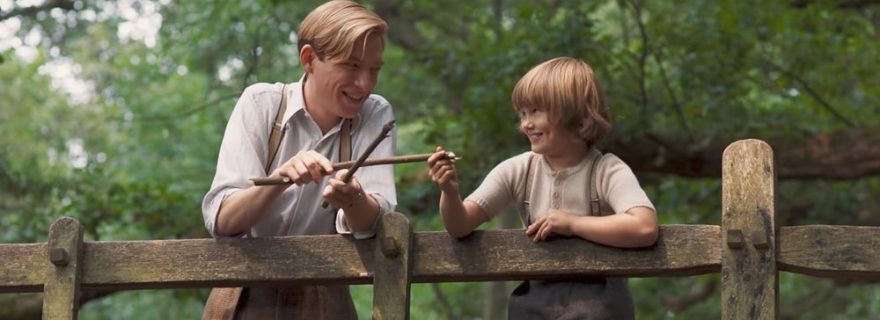'Goodbye Christopher Robin'
Movie Rating:
3
The concept of a bio-pic about the creation of Winnie the Pooh sounds like the most maudlin movie imaginable. What makes ‘Goodbye Christopher Robin’ watchable is the surprising darkness surrounding the joyous creation of Pooh, Tigger, Piglet and the 100 Acre Wood.
Domhnall Gleeson stars as Alan Milne, a popular comedic playwright and member of the London elite known for his wealth, witty barbs and banter. He’s married to an equally erudite and privileged actress (Margot Robbie), and lives a life of parties and teatimes and few responsibilities. At least, that’s true until he’s drafted into World War I and returns with severe PTSD. That forces Milne to give up his lavish London lifestyle and move to the country in search of solitude. He and his wife have an adorable young child named Christopher Robin (Will Tilston), and though they leave most of the parenting to a nanny (Kelly Macdonald) in the traditionally upper crust British way, Milne finds some bliss when he keeps the war memories at bay. A fortnight alone with his son and stuffed animals in the woods soon sparks the writer’s imagination. He and the boy create Winnie the Pooh, which the author turns into children’s stories that quickly grow into a massive phenomenon.
So far, so frivolous. Aside from the PTSD backstory, the origin of Winne and friends proves to be exactly what you’d imagine, and Simon Curtis (‘My Week with Marilyn’) shoots it with the soft light sentimentalism that defines the middlest of middlebrow British light entertainment. Then things get interesting. There are hints of more complicated drama throughout as the parents of privilege frequently treat their son more as an amusement and accessory than a responsibility. Then when the books get famous and the “real” Christopher Robin becomes an unexpected celebrity, the Milnes capitalize on it by forcing their boy to endure celebrity lunches and endless interviews and press events that the kid despises. He essentially loses his childhood to becoming the pop culture image of innocent childhood, in an irony so delicious it’s amazing that his playwright father didn’t notice. Worse still, when the little boy goes to school and grows up, he finds himself endlessly bullied as soon as anyone discovers his literary namesake, leading to further estrangement from his family and the fantasy that defined them all for a few brief years.
When the film transitions into the effects the Pooh phenomenon had on the young boy who created/inspired them, ‘Goodbye Christopher Robin’ becomes compulsive viewing. It’s a twisted little story of negligent parenting in the name of fueling the collective fantasies of children worldwide. Young Will Tilston delivers his dazed role with surprising depth for such a young actor, while the frightfully British ignorance and poor parenting is played with chilly accuracy by Gleeson and Robbie. The film has an amusing twist on cozy bio-pic clichés that Simon Curtis enjoys playing with, given that he has made a career out of more conventional bio-exploitations. Unfortunately, the movie doesn’t quite go all the way. As wonderful as Kelly Macdonald is as the nanny-sized heart of the film (and she’s always wonderful), her character is so blatantly present only to force the parents to learn lessons that it becomes distracting. Eventually, that leads to fact-fudging in the name of inspiration.
The sad truth of the matter is that Christopher Robin never fully recovered from the trauma his childhood fame thrust upon him. He remained strained and estranged from his family and refused to collect any residuals from Pooh after his parents passed. The movie doesn’t quite go all the way there, though, fabricating a nauseating scene where 18-year-old Robin and daddy make peace while gazing upon the majesty of the 100 Acre Wood. That feels grossly manipulative from a storytelling standpoint and just plain gross in how it softens the story. While Curtis does a wonderful job subverting bio-pic clichés for the most part, he just can’t stop himself from fictionalizing the finale to tug extra hard on heartstrings. That lessens the impact of what could have been a special film, but thankfully doesn’t kill it. This is still hardly the Winnie the Pooh origin story that you’d expect, and is all the more fascinating for it.



